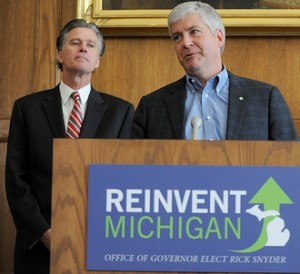Michigan Forward and Detroit Branch NAACP Call On Governor For Transparent And Accountable Review Teams
 On Monday, January 23, Michigan Governor, Rick Snyder received a letter from Michigan Forward and the Detroit Branch NAACP calling for greater transparency and accountability from the Governor’s teams conducting emergency management reviews in Detroit and Inkster. The letter mailed on Friday, January 20, 2012 cites alarming trends disenfranchising Michigan residents affected by financial mismanagement and resolving fiscal crisis.
On Monday, January 23, Michigan Governor, Rick Snyder received a letter from Michigan Forward and the Detroit Branch NAACP calling for greater transparency and accountability from the Governor’s teams conducting emergency management reviews in Detroit and Inkster. The letter mailed on Friday, January 20, 2012 cites alarming trends disenfranchising Michigan residents affected by financial mismanagement and resolving fiscal crisis.
Both organizations view the emergency management review process as a huge red flag to the manner in how Gov. Snyder applies the absolute power afforded to his administration over communities in financial distress. Neither team conducting emergency financial reviews in Inkster or Detroit has held open meetings with the public to inform and engage their local communities and taxpayers.
“Public Act 4 is a glaring example of how ineffective this law is; taxpayers are the last notified, but the first billed in this process and that’s not fair,” says Brandon Jessup, Chairman and CEO, Michigan Forward. “The exclusion of community members severely discredits the ‘early warning’ theory often used by Michigan’s Chief Executive. Public Act 4 provides a blank check to special interests focused on selling public assets, eliminating public contracts and dissolving Democracy.”
Michigan Forward points to the Detroit City Council led public hearing held on December 1, 2011 as a strong example of Democracy in action. Leaders from many local labor organizations and community groups presented short-term solutions to Detroit’s City Council that could provide cost savings into the hundreds of millions.
“As long as this process is conducted in the dark, residents lose, back-room discussions will continue and the integrity of this process will continue to ebb,” says Jessup. “Cutting the city’s short term deficit must be priority, however, we can’t discuss public debt without a public process. Public Act 4 doesn’t get to the heart of the problem in Michigan’s broken core communities; they are all lacking revenue. In light of an emergency we expect the Governor, Treasurer and their appointees to recognize and address this in a progressive working fashion.”
 Michigan Forward, the Detroit Branch NAACP and allies against Public Act 4 remain committed to constructing progressive solutions to the financial crisis many municipalities and school districts face here in Michigan. Our suggestions encourage a review process that opens the door of transparency and accountability.
Michigan Forward, the Detroit Branch NAACP and allies against Public Act 4 remain committed to constructing progressive solutions to the financial crisis many municipalities and school districts face here in Michigan. Our suggestions encourage a review process that opens the door of transparency and accountability.
“How can we affectively help the people if we eliminate the people from the very process that is supposed to convey to the people what the problems are?” says Rev. Dr. Wendell Anthony, President, Detroit Branch NAACP. “We cannot say transparency for some and closed door decisions for others. Let the doors be opened.” The nation’s largest NAACP unit has collected over 10,000 petition signatures since December to help repeal Michigan’s Emergency Manager Law.
The letter calls for the governor to immediately direct his present and future review teams to hold public meetings, follow the guidelines set in Michigan’s Open Meeting Act of 1976 and implement five additional principles:
- Meetings held by review teams be held within the municipality or school district under financial review
- Financial review team meetings are publicly posted 10 days before the meeting date; including the date, time and place of the meeting
- Meetings of review teams under Michigan’s Emergency Manager Law are posted on the official website of the Michigan Department of Treasury
- Minutes of review teams meetings are posted on the official website of the Michigan Department of Treasury
- Review teams use the entire 60-day review period to conduct an open, transparent review of municipal or school district finances and fiscal health.
The effort to repeal Michigan’s Emergency Manager Law has collected over 190,000 signatures enroute to its goal of 250,000. Only 161,304 valid voter signatures are needed to place the issue on the ballot in November 2012. When the signatures are validated, PA 4 is suspended until the general election.





